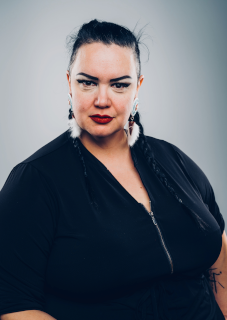Faculty of Law appoints new Indigenous assistant professor
Lauren Bannon - 4 August 2022

The Faculty of Law has appointed Tamara (Baldhead) Pearl as an Indigenous assistant law professor.
“I am deeply honoured to join this team of exceptional legal scholars,” said Pearl. “When offered this position, I was humbled and overjoyed at the opportunity to contribute to the quality education of law students with an Indigenous lens.”
“I am delighted that Tamara has agreed to join the Faculty as an assistant professor, and I am confident that her knowledge and experiences will positively and significantly contribute to the continued development of our Indigenous Law program,” said Dean Billingsley.
Pearl originally joined the Faculty as the Indigenous support manager in 2021, where she provided crucial support to Indigenous students. In this role, Pearl launched the Wahkohtowin Law and Governance Lodge summer program, Launchpad into Law, which was created to expose Indigenous law students to Indigenous legal traditions and train them in core legal skills prior to the beginning of their first law school year.
“I’ve learned much along the way, but the sense of community that Indigenous students have for each other is most memorable for me in that role,” said Pearl.
Pearl, who is Nēhiyaw (Plains-Cree) from One Arrow First Nation, grew up in Saskatoon’s core neighbourhoods. She spent summers on reserve with family, where she participated in ceremony and many community social gatherings.
After completing a BA in Anthropology from the University of Saskatchewan, Pearl went on to earn her JD and LLM from the same institution. She is now undertaking a PhD in Law at the University of Ottawa.
As an assistant professor, Pearl educates law students on how Indigenous peoples are directly affected by Canadian laws — and she also incorporates a focus on “anti-dominance training.”
“For me the most specific issue that needs the most attention right now is reconciliation,” said Pearl. “Anti-dominance means to challenge deeply rooted narratives of settler-colonial dominance in law schools, which I believe is an effective prerequisite for meaningful and mutual reconciliation, which is the focus of my research.”
By incorporating her research into her lessons, Pearl aims to contribute to training legal practitioners by using anti-dominance to respectfully engage with Indigenous legal traditions and communities while using Treaty relationships as a guide.
“What I am hoping to achieve as assistant professor, and as an Indigenous woman, is to help train law students to not only better our communities, but bridge them,” said Pearl. “We can do this through māmawī wīcihitowin or ‘working together and helping one another.’”